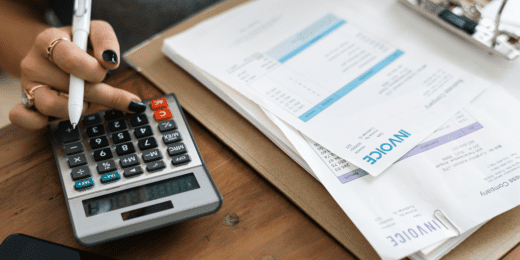Private limited companies are required to pay Corporation Tax on profits generated from all forms of taxable income. To do so, a company must be registered with HMRC as ‘active’ for Corporation Tax purposes. This must be done no later than 3 months after carrying on any type of business activity, which includes:
- buying and selling goods and services
- renting or buying property or land
- paying directors and employees
- managing investments and receiving dividend income
- issuing dividends to shareholders
- paying company formation and accountancy fees through the business bank account
- receiving any other form of income, including bank account interest
If you set up a company but don’t intend to start trading straight away, you need to tell HMRC that it is dormant for Corporation Tax. Otherwise, HMRC will assume that your company is liable to tax and required to submit tax returns.
How much Corporation Tax does a company pay?
The amount of Corporation Tax a company has to pay depends on how much profit the business makes. The current Corporation Tax rates are as follows:
- 19% small profits rate (SPR) for companies with annual profits of £50,000 or less
- 25% main rate for non-ring fenced profits of £250,000 or more
Companies with annual profits between £50,000 and £250,000 will pay Corporation Tax at the main rate reduced by a Marginal Relief. This provides a gradual increase in the effective Corporation Tax rate between the small profits and main rates.
Your company will be liable to Corporation Tax on the following types of income:
- income from sales
- income from renting out property or land
- interest made on money held in deposit
- income from selling company assets (capital gains)
- any other type of business-related income
To work out how much tax your company owes, you will deduct all allowable business expenses from total profits when completing a Company Tax Return at the end of your accounting period.
Corporation Tax accounting period
A limited company’s accounting period for Corporation Tax begins on the day it becomes active for Corporation Tax. It ends on the accounting reference date (ARD).
Accounting periods are normally 12 months long and they usually correspond with the financial year in the company’s annual accounts. An accounting period can be shorter than 12 months, but it may not exceed 12 months.
Corporation Tax liability is determined by the amount of profit generated in each accounting period. A Company Tax Return must be prepared and filed each year to report this income to HMRC and work out how much tax is owed.
In the first year of trading, many companies have to prepare two Company Tax Returns because their annual accounts cover more than 12 months. In such instances, one tax return should be prepared for the first 12 months and a second return should be prepared for the additional period in the accounts.
These returns must be filed together, along with one set of full annual accounts. Thereafter, a company’s accounting period and financial year should align, unless the directors decide to change them.
How to register a company for Corporation Tax
Companies House will inform HMRC when your new company is registered, so there is no need to contact them yourself at that time. It will be assumed that your company is active unless you tell HMRC your company is dormant for Corporation Tax purposes.
Within a few weeks of incorporation, you will receive a letter from HMRC. It will be delivered to your registered office address. This letter will contain your company’s Unique Taxpayer Reference (UTR). It will also include details of your accounting and tax obligations, an overview of the information you have to send to HMRC, and guidance on how to set up an online account for filing tax returns and paying tax.
If your company is active, you will be required to register for Corporation Tax within three months of doing business. You will need to provide the following information to HMRC:
- date you started trading as a limited company
- company name and company registration number
- main address where business activities take place
- nature of your company’s main business activities
- date you will make your annual accounts up to
You can register for Corporation Tax online. To do so, you will need to create a Government Gateway account and provide your company’s Unique Taxpayer Reference.
When you have submitted this information, HMRC will work out your Corporation Tax accounting period and issue a letter confirming the deadlines for paying Corporation Tax and filing Company Tax Returns.
Filing Company Tax Returns
At the end of each accounting period, you must prepare a Company Tax Return and deliver it to HMRC. This should be done online. The return will show how much Corporation Tax your company owes (if any) on the profits it made during its most recent accounting period.
All taxable profits should be added together. Any relevant deductions should be taken off before you calculate the Corporation Tax liability. Your company will be subject to strict deadlines and requirements for Corporation Tax and you must:
- pay Corporation Tax on taxable profits no later than 9 months and 1 day after the end of your accounting period. This is usually the end of your financial year
- file a Company Tax Return (including full annual accounts) with HMRC no later than 12 months after the end of your Corporation Tax accounting period
You must prepare a Company Tax Return for HMRC regardless of whether your company makes a profit or loss during its Corporation Tax accounting period.
Your tax return should be filed online on Form CT600 with full statutory accounts and computations or calculations that clearly illustrate how the final figures were reached. If you are filing two returns to cover a period in excess of 12 months, you must file two CT600 forms but only one set of accounts.
Paying Corporation Tax
Corporation Tax should be paid electronically no later than 9 months and 1 day after the end of each accounting period. Please note: this deadline is three months before the deadline for filing your tax return.
You will pay Corporation Tax on all taxable profits generated from any type of income (e.g. from sales, rental income, disposal of company assets) as well as bank interest on money held on deposit.
Corporation Tax Calculator
Corporation Tax on overseas profits
All companies registered in the UK are required to pay Corporation Tax on all taxable income. This means they have to pay tax on overseas profits and chargeable gains. Overseas sales and foreign branches of a UK-registered business are simply an extension of the UK business.
Any trading losses that arise from non-UK sales or foreign branches can be relieved against UK profits.
Double taxation relief
Double taxation relief is applied when a UK business is taxed overseas on income that is earned through an overseas branch. This enables companies to offset overseas tax against what they pay to HMRC in the UK. Relief is restricted to the amount of UK tax the business pays on profits generated from overseas branches.
Optional exemption from tax on overseas profits
UK companies can elect for exemption from UK Corporation Tax on the profits they make from their overseas branches. The exemption must begin before the start of the company’s accounting period. This decision requires careful consideration. Once the election is made, it is permanent and you will not be able to relieve overseas trading losses against UK profits.
Controlled Foreign Company rules
The UK government recently made changes to the Controlled Foreign Company (CFC) legislation that deals with foreign income. The CFC rules were introduced as an anti-avoidance measure to prevent UK-resident companies from artificially diverting their profits to countries with lower tax rates.
Only profits that have been artificially diverted from the UK are taxed, rather than catching profits diverted from any country. This enables UK-based businesses to be more competitive in the global economy and create more jobs and investment.
Additional business taxes
You must register for VAT if your annual taxable turnover exceeds, or you expect it to exceed, the VAT registration threshold. It is currently set at £90,000. Voluntary VAT registration is also possible if your turnover is below the threshold. This allows small companies to enjoy the same benefits as larger firms.
If you employ any staff or pay yourself a director’s salary, you may have to register as an employer and operate PAYE. You will deduct Income Tax and National Insurance contributions (NICs) from wages each pay period. You may also be liable to pay employer’s Class 1 NICs if your employees (or any directors) earn above a certain amount.
Company accounting and tax obligations can be tricky. You must follow Generally Accepted Accounting Principles (GAAP), so it would be wise to seek advice or assistance from an accountant or professional tax advisor if you have no previous experience with such matters.
Stamp Duty tax
Stamp Duty Land Tax (or equivalent) is a type of tax that is payable when you buy property in the UK. In relation to limited companies in the UK, Stamp Duty is also a kind of tax that sometimes applies when you buy company shares. If the transferee (the new shareholder) pays more than £1,000 for the shares, 0.5% of the transaction value must be paid to HMRC in Stamp Duty or Stamp Duty Reservice Tax.
This tax is not applicable if the shares are transferred from one person to another for free, regardless of their value. However, Capital Gains Tax may apply if a profit is made from the sale of shares. This is payable by the transferor (the original shareholder who sells the shares).
Dormant company requirements
If your company is dormant (not trading), you don’t need to register for Corporation Tax. However, you must tell HMRC that your company is dormant for Corporation Tax purposes – otherwise, you’ll be expected to file a Company Tax Return.
Your dormant company will not have to pay tax or file tax returns until it starts trading. You must still complete an annual confirmation statement (formerly called an ‘annual return’) and dormant company accounts for Companies House each year.
Tax compliance checks for limited companies
A tax compliance check is the term for any kind of check carried out by HMRC to ensure individuals and businesses are paying the correct amount of tax and adhering to their tax obligations and other statutory requirements. A check may be carried out for many reasons, such as:
- Ensuring proper tax and accounting records are being kept.
- To check that tax returns have been filed.
- To confirm the accuracy of filed returns and accounts.
HMRC will contact you or your accountant if they wish to carry out a compliance check and they will tell you what it is they wish to review. When the check has been completed, HMRC will write to you to tell you the results. You may be asked to pay additional tax if it turns out that you owe more. If you have paid too much, you may be repaid tax and interest accordingly.
Penalties can be imposed if HMRC believes you have deliberately underpaid or over-claimed tax.
Common causes of tax penalties
Most tax penalties are caused by late filing of tax returns (Company Tax Returns, VAT returns, and Self Assessment tax returns) and the late payment or underpayment of any tax owed, including Income Tax, National Insurance contributions, employers’ National Insurance, Corporation Tax, and VAT.
Please note that the information provided in this article is for general informational purposes only and does not constitute legal, tax, or professional advice. While our aim is that the content is accurate and up to date, it should not be relied upon as a substitute for tailored advice from qualified professionals. We strongly recommend that you seek independent legal and tax advice specific to your circumstances before acting on any information contained in this article. We accept no responsibility or liability for any loss or damage that may result from your reliance on the information provided in this article. Use of the information contained in this article is entirely at your own risk.








Join The Discussion